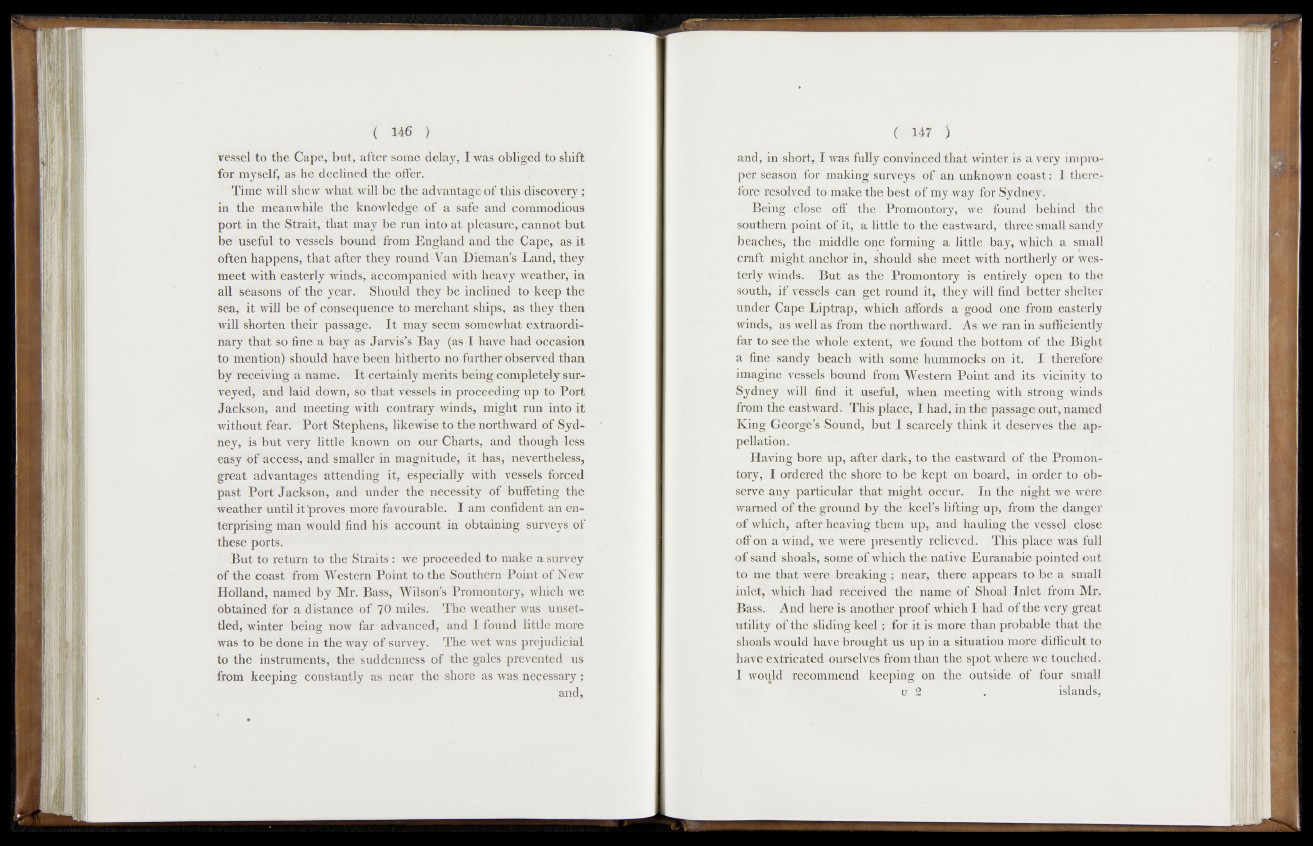
Vessel to the Cape, but, after some delay, I was obliged to shift
for myself, as he decMaed the offer.
Time will shew what will be the advantage of this discovery;
in the meanwhile the knowledge of a safe and commodious
port in the Strait, that may be run in td a t pieasurey cannèt but
be useful to vessels bound from England and the Cape, as it
often happens, that after they round Van Dieman’s Land, they
meet with easterly winds," accompanied with heavy weather, in
all seasons of the year. Should they be ihelined to keep the
sea, it will be of consequence to merchant ships, as-they then
will shorten their passage. I t may seem somewhat extraordinary
that so fine a bay as Jarvis’s Bay (as I have had occasion
to mention) should have been hitherto no further observed than
by receiving a name. I t certainly merits being completely surveyed,
and laid down, So that vessels in proceeding up to Port
Jackson, and meeting with contrary winds, might run into it
without fear. Port Stephens, likewise to the northward of Sydney,
is but very little known on our Charts, and though less
easy of access, and smaller in magnitude, it has, .nevertheless,
great advantages attending it, especially with vessels forced
past Port Jackson, and under the nècessity of buffeting the
weather until it'proves more favourable. 1 am confident an en*
terprising man would find his account in obtaining surveys Of
these ports.
But to return to the Straits: we proceeded to make a survey
of the coast from Western Point to the Southern Point of Mew'
Holland, named by Mr. Bass, Wilson’s Promontory, which we
obtained for a distance of 70 miles. The weather was unsettled,
winter being now far advanced, and I found little more
was to be done in the way of survey. The wet was prejudicial
to the instruments, the suddenness of the gales prevented us
from keeping constantly as near the shore as was necessary;
l and,
and, iff shorty I was fully convineedfhat winter is a very improper
season for making surveys of an unknown coast: I theref
fore resolved to make the best of my .way for Sydney,
'Being ologe-joff the Promontory;'" we^töirüd behind tiff
Southern point of it, a little to the eastward, - tha&eismall sandy
beaches, the-.middleone forming a little bay, which a small
craft might anchor in, should she meet with northerly of w£Sr
terly winds. But as. the Promontory is entirely open to the
south, if vessels can get round iff the^ will find better shelter
under Cape Liptrap, which affords a good one from easterly
winds, as well as from the northward, Astperan in sufficiently
far to see the whole extent;, we found the bottom of 'the Bight
a fine sandy beach with some hummocks on it. I therefore
imagine vessels bound from Western Point and its vicinity to
Sydney will find it useful, when meeting with strong winds
from the eastward. This place, I had^nh the passage out, named
King George’s Sound, but I scarcely think it deserves tiff, apr
pellation.
. Having bore up, after dark, to the eastward of the Promontory,
I ordered the shore to be kept on board, in order tq obr
serve any particular that might occur. In the night we were
warned of the ground by the .keel’s lifting up, from tifie danger
of which, after heaving.them up, and hauling the vessel close
off on a wind, we were presently relieved. This place was full
of sand shoals, ^ome of which the native Eursanabie pointed out
to me that were breaking ; near, there appears to be a small
inlet, which had received the name of Shoal. In le t. from Mr,
Bass. And here is another proof which I had of the very great
utility of the sliding-keel; for it is more than probable that the
shoals would have brought us up in a situation more difficult to
have extricated ourselves from than the spot where we touched*
I would recommend keeping on the outside of four small
u 2 ' . islands,